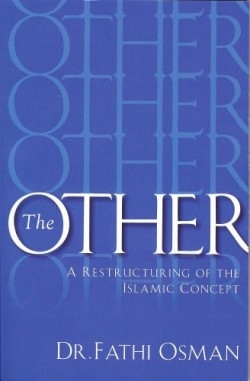The Other
A Restructuring of the Islamic Concept
In a world where extremists often act out in violent ways against other religions and other cultures in the name of their own beliefs religious leaders attempt to find ways to establish and practice tolerance if not acceptance. This is especially so with regard to Islam which many Westerners have come to view as one of the world’s most violent religions as a result of the events of September 11 2001.
Dr. Fathi Osman tackles this topic in his workmanlike but thorough philosophical examination of the “other” in Islam and the world’s religions. Osman’s detailed exploration of the Quran and the traditions of Islam provide one of the most complete treatments of this topic and his book will help Muslims to rethink the notion of religious dialogue.
Osman engages in ijtihad or the practice of the greatest possible intellectual effort to interpret and implement divine guidance. Since the seventh century numerous imams and other leaders have engaged in such an effort to discern the meaning of the Prophet’s words for their own generation. Osman attempts to discover through this process what the Prophet’s words mean for Islam in the twenty-first century.
Osman focuses on the idea of the “other” since all religions must recognize the humanity of the other while at the same time defining themselves over against these others. In other words Muslims must respect the other while not taking on their beliefs. Osman observes that “it is of great importance to keep in mind that understanding ‘the other’ [means] accepting and dealing with him/her as an equal human being who has the full right to have differences from us….Understanding ‘the other’ means the acceptance of human nature and equal human rights for all human beings.”
At the same time he cautions accepting the full human rights of the other does not mean imitating the other. Quoting from the Quran 11:118-119 he points out that human nature itself dictates human diversity. God could have created one human community but God chose otherwise and created free will and individual choice.
Central to Osman’s arguments is the belief in one God. Such belief strengthens and deepens the social equality and cooperation between all people. Worshipping the One God secures the “utmost goal of securing human rights and dignity and cannot be considered merely a theological matter.”
Although Osman’s study grapples with an important issue his prosaic writing and his pastiche of primary sources rob the book of its effectiveness. Overall Osman’s book will appeal primarily to Muslims whose deep study of the Quran will allow them to reconsider the idea of religious diversity.
Reviewed by
Henry L. Carrigan
Disclosure: This article is not an endorsement, but a review. The publisher of this book provided free copies of the book and paid a small fee to have their book reviewed by a professional reviewer. Foreword Reviews and Clarion Reviews make no guarantee that the publisher will receive a positive review. Foreword Magazine, Inc. is disclosing this in accordance with the Federal Trade Commission’s 16 CFR, Part 255.

